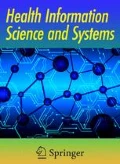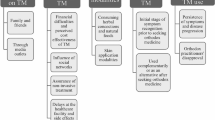Abstract
Purpose
Traditional Chinese medicine (TCM) has recently attracted increasing interests in cancer treatment. It was found that TCM-based treatment, combined with other therapies, can help improve patients’ life quality. However, the existing research in TCM lacks a systematic modelling for the causal relationship of the factors related to the diagnosis and decision making.
Methods
In this paper, we proposed the use of fuzzy cognitive map (FCM) to represent the cognition of TCMs usage in cancer treatment.
Results
Through a case analysis, we analyse and summarise the effects of Chinese herbal medicine in breast cancer management.
Conclusion
FCMs can visually represent the cognitive knowledge, particularly the causal relationship among key factors of TCM effects and the related breast cancer status.



Similar content being viewed by others
References
Bourgani EA, Stylios CD, Georgopoulos VC, Manis G. A study on fuzzy cognitive map structures for medical decision support systems. In: the 8th conference of the European society for fuzzy logic and technology, pp. 744–751
Cohen I, Tagliaferri M, Tripathy D. Traditional chinese medicine in the treatment of breast cancer. Semin Oncol. 2002;29(6):563–74.
Froelich W, Papageorgiou EI, Samarinas M, Skriapas K. Application of evolutionary fuzzy cognitive maps to the long-term prediction of prostate cancer. Appl Soft Comput. 2012;12:3810–7.
Fu LL, Xu H. A preliminary study of the effectiveness of Chinese therapeutic food on regulating female reproductive hormones. Integr Med Insight. 2011;6:7–12.
Fu LL, Xu H. Chinese medicine and integrative approaches in the prevention of breast cancer—acupuncture meridian, Pulsed Eletromagnetic Field Test and Chinese Food Therapy (Chapter 17). In: Recent advances in theories and practice of chinese medicine. 2012. p. 353–361.
Hu H, Li J, Wang H, Daggard G. Combined gene selection methods for microarray data analysis. Knowledge-based intelligent information and engineering systems. Berlin: Springer; 2006. p. 976–83.
Huang J, Peng M, Wang H, Cao J, Gao W, Zhang X. A probabilistic method for emerging topic tracking in microblog stream. World Wide Web. 2017;20(2):325–50.
Kosko B. Hidden patterns in combined and adaptive knowledge networks. Int J Approx Reason. 1998;2(2):377–93.
Lee D, Liu H, Rong J, Xu H, Miao Y. Decision making for traditional Chinese medicine based on fuzzy cognitive map. In: the 7th international conference on health information science, pp. 25–36
Li H, Wang Y, Wang H, Zhou B. Multi-window based ensemble learning for classification of imbalanced streaming data. World Wide Web. 2017;20(6):1507–25.
Liu S, Sun SP, Lu DM. Clinical study of 302 syndrome differentiation criteria for postoperative patients with breast cancer. Chin J Med. 2004;19(11):666–8.
Liu S, Wu XQ, Chen QJ. Discussion on syndrome differentiation of 407 patients with breast cancer after operation. Liaoning J Tradit Chin Med. 1999;26(9):387–8.
Ma J, Sun L, Wang H, Zhang Y, Aickelin U. Supervised anomaly detection in uncertain streams pseudoperiodic data. ACM Trans Internet Technol. 2016;16(1):4:1–20.
Medicine T.D.C.f.I . Twyford & london masters: Pdt: Pdt/sdt study—16 patients (2009)
Miao Y. Fuzzy cognitive map for domain experts with no artificial intelligence expertise. In: the 13th international conference on control automation robotics & vision
Miao Y. Modelling dynamic causal relationship in fuzzy cognitive maps. In: 2014 IEEE international conference on fuzzy systems, pp. 1013–1020
Miao Y. Visualising fuzzy cognitive maps. In: 2012 IEEE international conference on fuzzy systems, pp. 1–8
Papageorgiou EI. A new methodology for decisions in medical informatics using fuzzy cognitive maps based on fuzzy rule-extraction techniques. Appl Soft Comput. 2011;11(1):500–13.
Papageorgiou EI, Spyridonos PP, Glotsos DT, Stylios CD, Ravazoula P, Nikiforidis GN, Groumpos PP. Brain tumor characterization using soft computing technique of fuzzy cognitive maps. Appl Soft Comput. 2008;8:820–8.
Subramanian J, Karmegam A, Papageorgiou E, Papandrianos N, Vasukie A. An integrated breast cancer risk assessment and management model based on fuzzy cognitive maps. Comput Methods Progr Biomed. 2015;118:280–97.
Trendowski M. The promise of sonodynamic therapy: using ultrasound irradiation and chemotherapeutic agents as a treatment modality. Honors Capstone Project in Biology, Renee Crown University Honors Program at Syracuse University. 2014.
Wang KN, Bell JS, Chen EYH, Gilmartin-Thomas JFM, Ilomäki J. Medications and prescribing patterns as factors associated with hospitalizations from long-term care facilities: a systematic review. Drugs Aging. 2018;35(5):423–57.
Wu XQ, Wan H, Zhao J. TCM syndrome differentiation of breast cancer patients after surgery. Shanghai J Tradit Chin Med. 2005;9(8):3–4.
Xu H. The progress of resource, environment and health in China., Scope China III of the international council of scientific unions (ICSU)Beijing: Peking University Medical Press; 2004.
Xu H, Xu HE. Chinese food and cancer healing. Integr Med Insights. 2006;1:1–5.
Xu JN, Que HF. Discussion on syndrome differentiation of 241 patients with postoperative breast cancer. Zhejiang J Tradit Chin Med. 2005;12:530–2.
Zhang J, Tao X, Wang H. Outlier detection from large distributed databases. World Wide Web. 2014;17(4):539–68.
Author information
Authors and Affiliations
Corresponding author
Additional information
Publisher's Note
Springer Nature remains neutral with regard to jurisdictional claims in published maps and institutional affiliations.
Rights and permissions
About this article
Cite this article
Lee, D., Xu, H., Liu, H. et al. Cognitive modelling of Chinese herbal medicine’s effect on breast cancer. Health Inf Sci Syst 7, 20 (2019). https://doi.org/10.1007/s13755-019-0083-3
Received:
Accepted:
Published:
DOI: https://doi.org/10.1007/s13755-019-0083-3




